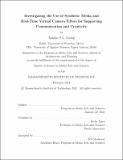Investigating the use of synthetic media and real-time virtual camera filters for supporting communication and creativity
Author(s)
Leong, Joanne S.L.(Joanne Sun Ling)
Download1252628223-MIT.pdf (49.15Mb)
Other Contributors
Program in Media Arts and Sciences (Massachusetts Institute of Technology)
Advisor
Pattie Maes.
Terms of use
Metadata
Show full item recordAbstract
Virtual representations of ourselves can influence the way we think, feel and behave. While this phenomenon has been explored heavily in the realm of Virtual Reality, little is known about the utility of synthetic media and real-time camera filters to reshape the perspective we have of ourselves and our capabilities. At the same time, the prevalence and popularity of these technologies have surged, coupled with greater usage of online communication tools. Motivated by a desire for self-improvement in an age of online digital communication, this thesis aims to investigate how synthetic media and real-time camera filters can be used to influence performance in target tasks, particularly in the realm of communication and creativity. This work encompasses the results of an extensive online survey (174 respondents) regarding the professional use of video-based online communication tools. It unveiled that there is an interest in self-improvement in this context and that the self-view feature of such tools may serve as a potential channel for helpful user input. Building upon this, a user study was conducted (28 participants) in which generative AI was used to synthesize videos of participants excelling in confident communication. It was found that exposure to this form of personalized media may alter feelings of confidence and stress and be implicitly helpful to some by serving as personalized role-models and guides. Following this, a second user study was conducted to explore real-time self-image manipulation via real-time camera filters (21 participants) in video calls. It was observed that applying such filters may trigger various responses in people with regards to mood, embodiment, and creativity. This thesis extends research into the topic of self-image manipulation and opens up a novel perspective that such technologies may help to serve as accessible and scalable approaches to manipulating one's self-view to nurture personal growth.
Description
Thesis: S.M., Massachusetts Institute of Technology, School of Architecture and Planning, Program in Media Arts and Sciences, February, 2021 Cataloged from the official PDF version of thesis. Includes bibliographical references (pages 85-95).
Date issued
2021Department
Program in Media Arts and Sciences (Massachusetts Institute of Technology)Publisher
Massachusetts Institute of Technology
Keywords
Program in Media Arts and Sciences